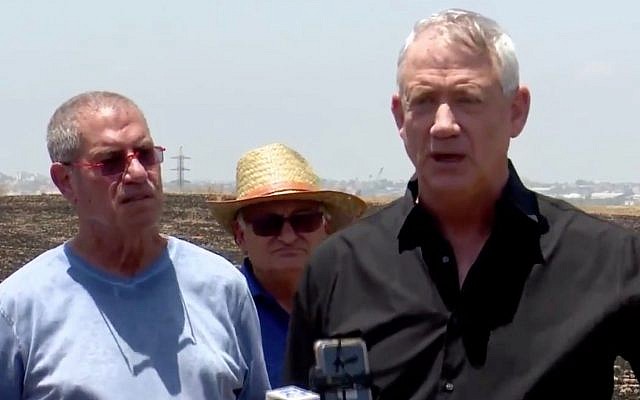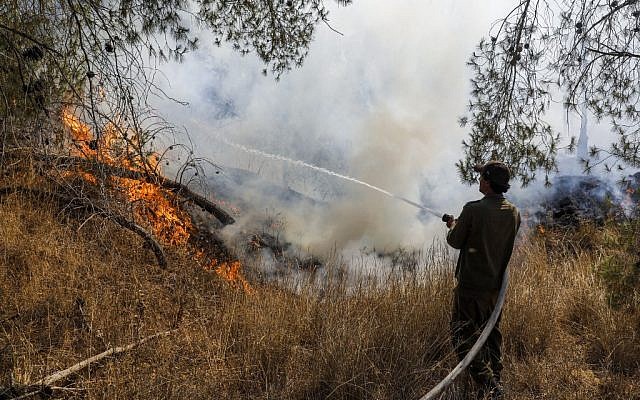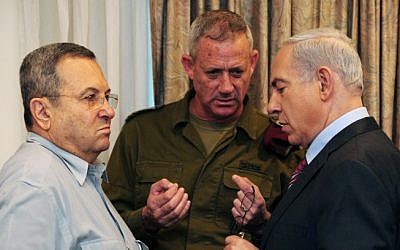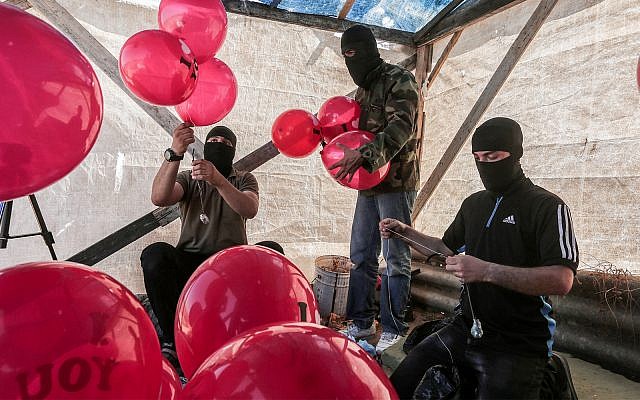Former top defense officials under the PM assail him over the agreement; IDF nabs Gazan carrying knife who crossed the border

Blue and White party leader Benny Gantz railed against Prime Minister Benjamin Netanyahu on Friday over an agreement to end arson attacks from the Hamas-ruled Gaza Strip, joining a chorus of opposition criticism over the premier’s policy toward the Palestinian enclave.
“Netanyahu is filling up Hamas’s fire balloons with helium,” Gantz told reporters in a burnt field in southern Israel. “The truce agreement… again proves it is Hamas dictating things to Netanyahu.”
Gantz, a former IDF chief under Netanyahu, called for “strong attacks” on Hamas in response to incendiary balloon launches from Gaza.
“If there is no strong response, there is no deterrence. If there is no deterrence, there is no calm,” he said.
Gantz has frequently attacked Netanyahu over Gaza on the campaign trail, but has given few details on what he would do differently if he were prime minister.
Netanyahu has previously defended his Gaza policy by saying it is in Israel’s interest to do everything possible to avoid a major military operation in the Strip.

Shortly after Gantz spoke, the Israel Defense Forces said a Palestinian was arrested carrying a knife after crossing the Gaza border.
Earlier Friday, an Israeli official confirmed that the country had agreed to a number of economic concessions for Gaza in exchange for an end to arson attacks and other violence along the border.
“In response to a request from the United Nations and Egypt, Israel will return the fishing zone [to 15 nautical miles] and the flow of fuel, in light of a promise that Hamas will stop the violence against Israel. If Hamas will not abide by this commitment, Israel will reinstate sanctions,” said the official, who spoke on condition of anonymity.
Following the deal, fuel trucks entered the Gaza Strip to help increase production at its sole power plant, a Hamas source said.
Despite the UN- and Egyptian-mediated agreement, an incendiary device disguised as a book was sent into Israel on a bunch of balloons, while other balloon-borne incendiaries caused at least four fires in the border region.

Israel does not officially recognize ceasefire deals with Hamas, which rules Gaza, or publicly acknowledge dialogue with the terror group.
Friday’s agreement drew condemnations from a larger number of opposition figures, including former Labor prime minister Ehud Barak, who accused Netanyahu of “surrendering” to Hamas.
“After hundreds of fires, once again a problematic deal is reached that maybe with difficulty will be good for a few days,” Barak tweeted.
“In the absence of a decision on the aims and path, deterrence is eroding, the government has become hostage to Hamas, which wants to inflame the land and grow stronger,” he added.
Barak, a former IDF chief of staff and defense minister under Netanyahu, announced Wednesday he would return to politics and launch a new party ahead of the elections in September.
His criticism joined that of Yisrael Beytenu party leader Avigdor Liberman, another defense minister under Netanyahu who resigned in November to protest a previous ceasefire with Hamas.
“This morning, like a recurring ritual, Hamas members thanked Benjamin Netanyahu for the reprieves he’s given them as part of a tendentious submission (‘calming’) agreement from us, and have sent residents of the State of Israel a huge cluster of balloons with an explosive charge,” Liberman wrote on Facebook.
Arson attacks picked up considerably in the past week, with teams affiliated with Hamas launching hundreds of helium-inflated balloons and condoms carrying incendiary devices and, in some cases, explosives across the border into Israel.
There have been no injuries reported in the blazes, most of which have occurred in agricultural fields and grasslands, but they have caused significant damage to crops and wildlife. Several fires were also reported inside Israeli communities in the Sha’ar Hanegev, Sdot Negev and Eshkol regions.

In response to the ongoing attacks, which represent a breach of an unofficial ceasefire agreement between Israel and terror groups in the Strip, Israel halted the flow of gasoline and diesel fuel into the Gaza Strip Tuesday, a move that drew criticism from human rights advocates, who condemned it as collective punishment.
The restrictions on the fishing zone had also been criticized for punishing fisherman who have no link to the airborne attacks. Last week, Israel extended the fishing zone to 10 nautical miles, after it had been closed entirely for several days.
On Tuesday, a senior Hamas member warned Israel that its policies toward Gaza were endangering unofficial ceasefire understandings between the sides.
Earlier this month saw a fresh surge in serious violence between the two sides, including two nights of rocket attacks and retaliatory Israeli air force strikes.
As reported by The Times of Israel
